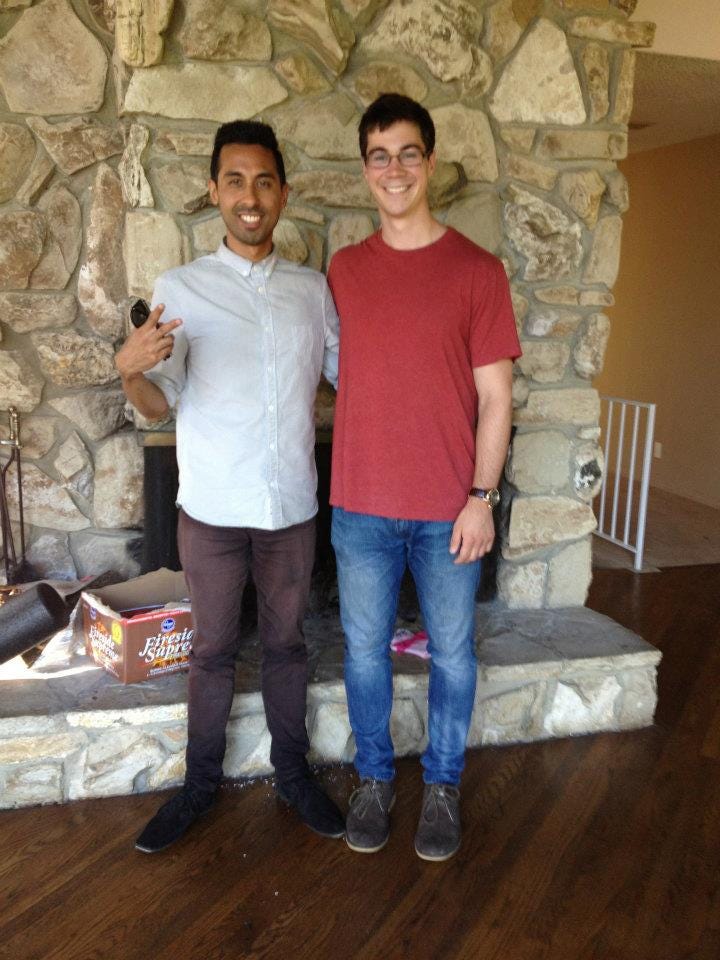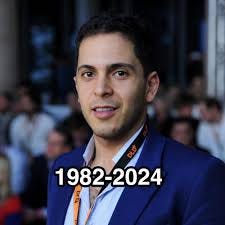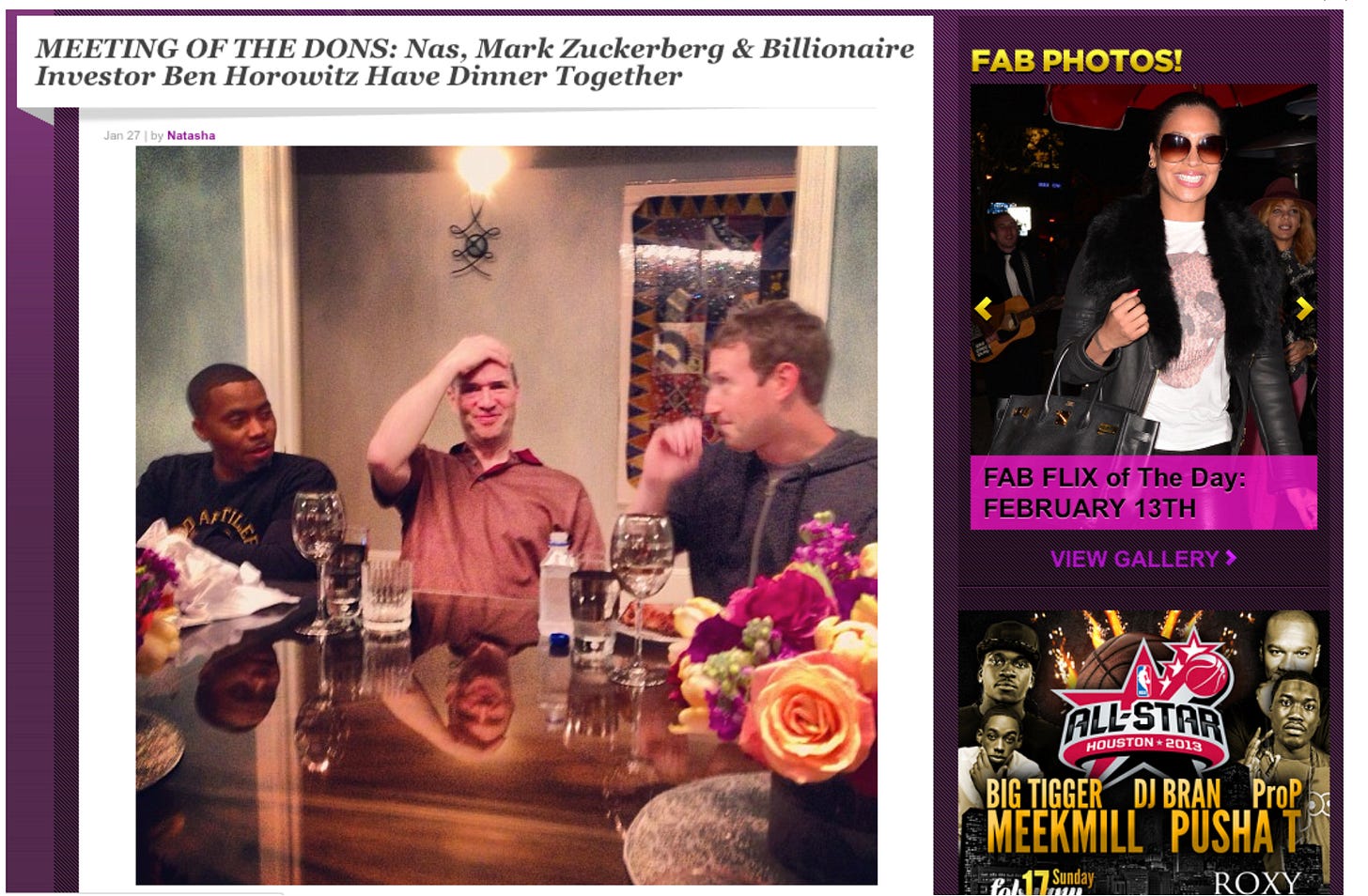It was nearly dark when I pulled up to the house on Via Escondido Drive. I was about to spend a summer in this house with a man I’d met on the internet. The moment my finger made contact with the doorbell, it occurred to me this could all be one elaborate catfish. The sound of the doorbell, followed by a small commotion inside, was revealed to me through the open window of a bathroom facing the driveway. Moments later, the front door was opened by a shirtless man sporting colorful chinos and sunglasses, who, if I didn’t know any better, seemed surprised by my presence. The man was Mahbod Moghdam, co-founder of RapGenius.com and my roommate/boss for the summer of 2012.
Last weekend, I learned on Twitter (of all places) that Mahbod passed away due to complications from a recurring brain tumor at the age of 41. I can’t say that we were best friends or that we remained all that close following my stint in the RapGenius house that summer (save for the occasional WhatsApp/Instagram update). But the tragic news unearthed a few memories I found worth sharing. I briefly touched on my experience during the early days of RapGenius in a piece called Falling Up. This article will go further into my experience that summer and hopefully serve as a worthy tribute to one of the most unique people I’ve ever met.
Mahbod had a knack for saying things that were specious, but hard to debunk in real-time. He possessed a faux-bravado that when backed with his Ivy-league vocabulary made most of what he said sound obviously true at first glance. His subtle, yet noticeable speech impediment lent him a boyish charm that gave the impression you were interacting with a precocious teenager. I’m not calling him a liar, but a fabulist of sorts, who excelled in a Barnum & Bailey style ring-leadership and made straw-man enemies (mostly online) to rally his troops in service of a higher purpose.
That evening when I arrived, I was greeted by this character. In those first weeks, it felt like I was interacting with the live incarnation of his digital persona. He took me on a nickel tour of the “Genius Mansion,” still shirtless and still wearing his Raybans indoors, after dark. The term mansion was generous for this 70s style ranch house, one of the few fixer-uppers on the block. There were three bedrooms down a long hallway to the right of the entrance. A long, skinny kitchen boasted big windows framed by citrus trees in the front yard. The entire floor plan felt designed to pull you into the living room, a vast communal space a few steps below the primary floor of the house.
This slightly sunken area had the quality of a stage in a black-box theater. A panopticon of sorts where most of the action that summer took place. It had a stone fireplace, a small coffee table, a worn sectional, a make-shift work-station — all bathed in the California sunshine beating through the sliding glass doors that opened to a sprawling terrace. Eventually we found our way to my sleeping quarters: a small, carpeted room with nothing but a foam pad on the floor. Mahbod made some remark about Steve Jobs and minimalism and left me to get settled in. I looked at myself in the mirrored sliding doors of the closet. A gust of wind rattled the vertical blinds to my right as I reflected: what have I gotten myself into?

I had reason to be apprehensive. A few weeks before my cross-country road trip to California, I received a call from Mahbod. He went on and on about Broken Window Theory: the idea that visible signs of crime leads to further crime. It’s a long debated academic theory that became the back-bone of Rudy Guiliani’s stop and frisk campaign among other policing methods targeting minor crimes. He compared RapGenius to an urban environment and poorly annotated lyrics the equivalent to a highly visible infraction. I needed to clean up the site, add meaningful annotations and build my “RapIQ” (the point system they used for moderators) if I wanted to spend the summer in Malibu. I panicked and went to work, but I felt I was off to a rocky start.
Nevertheless, my first morning in the RapGenius house gave rise to an optimism that outweighed the percolating anxiety from my arrival. I would soon learn that I was living under a benevolent dictatorship, one that prized a paleo-friendly diet, regular exercise and round the clock discipline trained on making the site (RapGenius.com) better. The internship wasn’t paid, but in exchange for my dedication I was given carte blanche at Whole Foods, a gym membership and a front-row seat to building the internet’s coolest website (I would later learn Mahbod wrote a Thought Catalog piece on how to steal from Whole Foods that was equal parts hilarious and controversial, his signature).
Mahbod had an obsession with health and wellness that pre-dates the modern longevity craze. His fixation, as I recall, bordered on mysticism, with various dietary restrictions (or indulgences) based more on vibes than on science (his piece How Running Backwards Changed My Life reads more like an Christopher Guest screenplay than a fitness column). This pseudo-religion required a daily pilgrimage to Whole Foods where we’d stock up on smoked salmon, 95% dark chocolate, avocados and truck loads of Mountain Valley Spring Water in glass bottles. We did regular cold plunges at Zuma Beach (before it was cool) and hiked in the nearby canyons.
We lifted weights at a gym in a strip mall up the Pacific Coast Highway where celebrity sightings were common (most notably, Sean Penn). One day, I found myself on the treadmill next to someone Mahbod identified as Blac Chyna; he pieced together she was dating rapper Tyga and somehow discovered they were renting a house on our street. Later that week, we rang Tyga’s doorbell, presumably to welcome him to the neighborhood (these were quite obviously false pre-tenses to pitch RapGenius). When his bodyguard gruffly dismissed our request to come in, Mahbod insisted we sneak around the side and see if we could say hello through the kitchen window. This was one of the many hare-brained schemes he championed in service of making RapGenius the best site in the world.

I adapted to the strict routine and began to like it. When we weren’t engaging our bodies physically, we put all of our mental and social energy into improving the site — annotating lyrics, community building and moderating, writing blog posts, finding rappers to onboard to the burgeoning verified artist program (like the Twitter Blue Check but way more baller, as Mahbod would say). I started to experience something akin to a good-natured Stockholm’s Syndrome: I was held captive to the whims of a neuro-divergent startup founder but our proximity in “the trenches” and shared routine made space for a strange but meaningful friendship.
Eventually, Mahbod’s bombastic veneer started to peel off. There were signs he was starting to let me in. He was the son of Jewish Iranian immigrants and a Los Angeles native. His parents lived in Sherman Oaks, a leafy suburb where we were occasionally treated to home-cooked meals and the company of his siblings, nieces, nephews and cousins. One time we returned the favor and hosted his nieces 3rd birthday party at the house in Malibu; I cooked steaks and Mahbod told me in private that his family claimed it was the best steak they had in their lives (hyperbole came naturally to him, but I like to think that this was a sign of acceptance from the Moghdams). If they’re reading this, my deepest condolences.
That summer left an indelible mark. We hosted a birthday party for Mike G, one of the lesser known Odd Future members (others include Tyler the Creator and Frank Ocean) during which our home was indistinguishable from a rap music video. We went to the recording studio in Compton where Kendrick Lamar laid down good kid, m.A.A.d city to teach Schoolboy Q how to use RapGenius and interact with his fans through lyrical annotation. Somehow we got invited to a BET Awards After Party where the two of us worked the crowd of rising stars and living legends like Rick Ross, Wale, Gun Play, and Common. The work was fun and frankly surreal. Was this how startups actually functioned? I wasn’t sure but at this point I was confident in the leadership of my entrepreneurial spirit guide.

Mahbod’s lack of filter would eventually become a liability for himself and the company. But that summer, it was pure entertainment. The website had enough credibility to get us access, but not enough scrutiny to pose any real risks. Mahbod could quote Shakespeare, freestyle a Nas lyric and outline his beef with Warren Buffet (certainly one-sided) in a single breath. He was a classically trained pianist and often sat down to bang out a Bach Symphony from memory. He opined aloud on the merits of various legal scholars, the importance of having a six pack, the double edged sword of marijuana use and the fact that sashimi is the only food one really needs.
He loved memes and internet culture. In fact, it seemed as if he had trouble distinguishing between online interactions and the real world. Perhaps that’s why he was so good at creating controversy in exchange for clicks. His preternatural ability to stir the pot on internet forums made his career. I would argue his style of interaction might be the template for what now passes as “discourse” on platforms like Twitter. He was no doubt a pioneer in this arena. He thrived on the knife’s edge and it fueled the company’s growth as well as his own star power.

The fall semester was looming and eventually my departure was imminent. It was an unconventional summer by any standards but an absolutely wild one considering I’d convinced my parents this was a legitimate internship at a Silicon Valley tech startup. It was the beginning of the era of social and mobile. I rode in my very first Uber with Mahbod (I think you still had to text a number and receive a call when your black car was outside). At the time, I still didn’t fully comprehend the extent to which this would have an impact on the way I approached my career, my philosophy around company building, and my understanding of how exactly the (tech) world worked.
In the following years, I maintained a loose affiliation with the RapGenius team. I hosted them on a panel at Brown University. I tagged along to a few parties in their New York City headquarters. I read (in disbelief) on TechCrunch that they raised $10M from a16z to build the world’s leading annotation platform. But my fondest memories are from that summer in Malibu. The fact I played a small part in the company’s growth alongside one of the most outspoken and enigmatic founders in the world was (and is) an exceptional story. But more more importantly, it led to a valuable friendship.
After his ouster from RapGenius he pivoted to crypto. Another vertical where he was well ahead of his time. While his antics were a matter of taste, his track record for identifying the next best internet native trend is second to none. To paraphrase Jay-Z, Mahbod was not a businessman, but a business, man. He was the living, breathing embodiment of whatever project he took on, sometimes to a fault. He certainly left an impression on me and I owe him a debt of gratitude for encouraging my own path to tech entrepreneurship.
We’d lost touch in recent years, and I assumed he was out of the woods following routine surgery on a benign tumor. My heart goes out to his close family and friends for a significant loss, much too soon. His family posted an obituary, quite fittingly, on the Genius platform.









